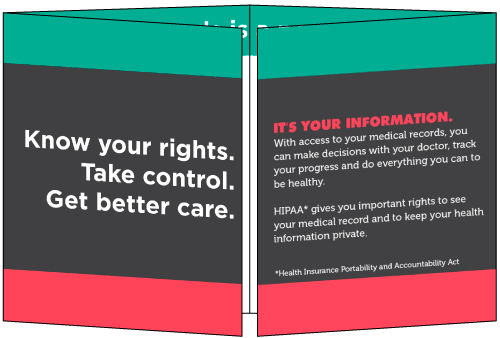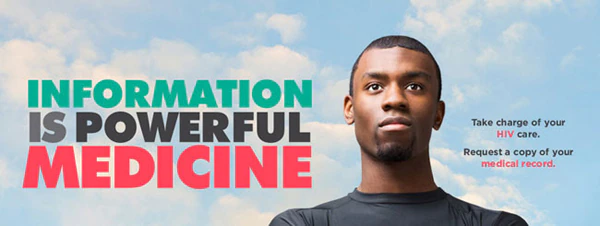Information is Powerful Medicine
HIV and HIPAA
Living with HIV requires being active in your medical care – making decisions with your doctor, tracking your progress, and doing everything you can to be healthy.
With HIV, you also may have concerns about keeping your status private.
Whether your health information is stored on paper or electronically, you’ve got the right to keep it private. Those rights are protected by a law known as the Health Insurance Portability and Accountability Act, or HIPAA, for short. HIPAA also gives you other important rights, including the right to a copy of your medical record.
It’s Your Information.
Having access to your medical record can help you better manage your health.
What can you do with access to your information?
- Check to make sure it is accurate and complete;
- Keep track of important health information like test results and prescriptions;
- Have your medical history available if you are getting a new doctor, switching to a different clinic, or visiting a specialist;
Keep track of all your medicines and dosages.

Get it.
You’ve got the right to see, or to access, your medical records. Sometimes you might not be able to see the full record, but you’ve always got the right to ask.
You can get a copy of your record electronically if your doctor keeps your information in an electronic health record. You may be charged a small fee for the cost of printing hard copies or for other supplies.
Check it.
Check to make sure your medical information is correct and complete.
If you think something is wrong or missing, you can ask your doctor to fix it. This is called an amendment. Your doctor may not agree with your request, but you always have the right to ask, and to have your disagreement added to your medical record.
Use it.
What does this mean for you?
- Less paperwork;
- Better care coordination between you and your doctors;
- Fewer unnecessary tests and procedures;
- Greater control over your health.
Know Who Has Seen It.
You also have the right to know how your health information is used and shared.
Your doctor is allowed to share your information for certain reasons, such as determining how to best treat you when you’re sick, or reporting a flu outbreak. But your doctors can’t give your information to an employer, for example, without your permission. If you’d like to know how your health information has been shared, you have the right to get a report. That’s called an accounting of disclosures
Share it.
Under HIPAA you can request to share your health information with someone, like a domestic partner, a parent, a sister or rother, or a friend.
Don’t Share It.
HIPAA gives you the right to ask your doctor or pharmacy not to share information with your health plan, if you pay out of pocket for an item or service.
Decide How to be Reached.
HIPAA gives you the right to say which phone number your doctors should call to reach you, so they can leave a message.
Know your Rights.
All these rights are spelled out in the HIPAA Notice of Privacy Practices, which is given to you by your doctor. If you haven’t seen the Notice, be sure to ask for a copy and read it carefully. It lets you know exactly how your rights are being protected.
Lastly, if you think your health information privacy rights have been violated in any way you have the right to file a complaint.
The Office for Civil Rights (OCR) is also responsible for enforcing civil rights laws that apply to recipients that receive federal financial assistance from the U.S. Department of Health and Human Services. These laws prohibit discrimination on the basis of race, color, national origin, disability (including discrimination because of HIV, AIDS, or Related Conditions) or age. Some laws may also protect against discrimination based on gender or religion.
We’re serious about working with you to protect your health information and make sure you have access to it. Know your rights.
Learn More
- More on Your Rights Under HIPAA
- Your Health Information Privacy Rights
- Privacy, Security, and Electronic Health Records
- Sharing Health Information with Family Members and Friends
- Your Rights as a Person with HIV Infection, AIDS, or Related Conditions
- The Right to Access and Correct Your Health Information
- Right to Access Memo
- Using eHealth Tools to Maintain your Record
Campaign Resources
Web Banners

- Download 300x250 Web Banners (ZIP 116KB)
- Download 728x90 Web Banners (ZIP 125KB)
- Download 160x600 Web Banners (ZIP 161KB)
Pocket Brochure

- Download 4x5 Pocket Brochure (PDF - 3MB)




